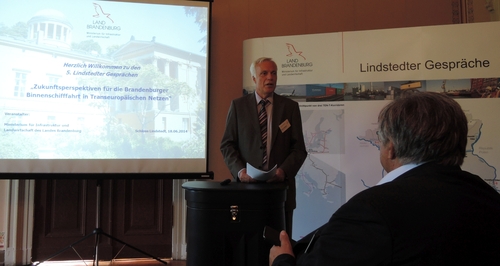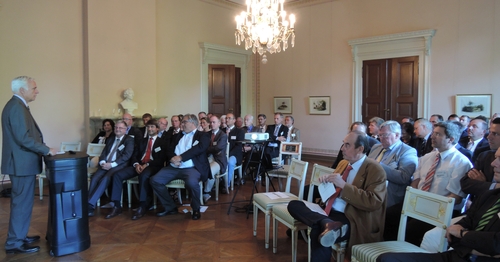On June 18, 2014, the Lindstedt Talks took place for the fifth time in the Lindstedt Palace in Potsdam. The event was again organised by WAGENER & HERBST on behalf of the Brandenburg Ministry of Infrastructure and Agriculture (MIL).
The topic “Future prospects for the Brandenburg inland waterways in Trans-European networks” attracted a great deal of interest among the participating representatives from industry and politics.
Horst Stiegler, member of the board of directors of the logistics network Berlin-Brandenburg, moderated the event which was opened by Egbert Neumann, Department Head Transportation MIL, standing in for Transport Minister Jörg Vogelsänger, who could not attend because of scheduling conflicts. His initial statement described the curent situation, objectives and plans regarding inland navigation from the point of view of Brandenburg’s government.

The three statements by Martin Bock, Managing Director of Fürstenwalder Futtermittel-Getreide-Landhandel GmbH & Co. KG (AGRAVIS Group); Heinrich Ahlers, Chairman of the Management Board of Bussport Logistics GmbH & Co. KG and Dr. Dietmar Rehmann, Head of the Hamburg branch of HTAG Häfen und Transport AG, Duisburg; showed that the positive development of ElbePort Wittenberge and HavelPort in Wustermark prove the potential of inland navigation in Brandenburg. The development of inland navigation in the capital region is, however, severely hampered, in particular, by the completely inadequate, more than 100 years old locks in Kleinmachnow and Fürstenwalde. Because of the lock-induced bottlenecks, negative investment decisions have already been made by shippers. The creation of planning and investment security with regard to the upgrading of these locks is indispensable for the economic future of whole regions.

The subsequent discussion, which was very lively with the participation of local politicians and parliamentarians, made it clear that a coordinated positioning of affected and interested freight forwarders, logistics companies, economic associations as well as municipal and state politicians is necessary and desired. The common interests are to be represented even more emphatically against the Federal level, which is responsible for most of the relevant inland waterway infrastructure, so that inland waterway transport as an environmentally friendly and economic transport sector can make even greater contributions to economic and environmental efficiency in Brandenburg.
The following presentations are available for download:
Neumann_MIL_Lindstedt_20140618.pdf (2,1 MB)
